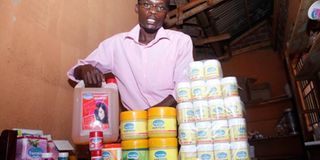Obama beneficiary into soap making

Martin Mugabi, the CEO of Twinkle Industries, displays some of the products he manufactures at his factory in Luzira. Photo by Rachel Mabala
What you need to know:
Martin Mugabi is one of Uganda’s pioneer beneficiaries of US President Barack Obama’s Young African Leaders Initiative. Judith Atim spoke to him on how he started a soap manufacturing enterprise.
When US President Barack Obama visited Kenya in July last year, he preached hope for the African continent and reiterated that the future of Africa is in the hands of young people.
US President Barack Obama’s Young African Leaders Initiative (YALI) programme seeks to empower young people and make them leaders in various fields including entrepreneurship, civic leadership and public management, among others.
Thirty year-old Martin Mugabi is a budding entrepreneur who dreams of sweeping across the continent by being the next home care products giant.
In 2014, Mugabi and a group of friends came together and founded what is now known as Twinkle Industries. Located in Luzira, a suburb South East of Kampala, his manufacturing business is housed in an old building that previously housed a bakery.
The products they manufacture mainly include bathing soap, liquid detergents, hair products, petroleum jelly and other such similar items.
His is a remarkable story of starting small and growing big. Today, he estimates his worth at more than Shs50 million. But just how much did he need as start-up?
“I started this business with about Shs100,000,” he says.
His first product was mixed in a basin in his living room.
When I visited his business premises in Luzira, he took me around and explained how the products are processed.
Our first stop was the soap making machine, which is an electric-powered mixer and boiler.
“This is where the actual chemistry of soap happens. If we are running it full time, in a day we can make about 300 Kgs of soap,” Mugabi explains.
This quantity translates to about 30,000 pieces of soap.
From this point, the mixture then moves to another machine - the soap loader - where the process is slightly different.
“Whatever is got from the mixer in its raw form is then put in this machine. But first we produce what is called the soap noodles, which are little strands of soap that help to mix everything so that the soap becomes fine,” he further explains.
The product from this machine is a long bar of soap that requires shaping or molding and then branding.
“We cut this very long bar of soap into pieces and then put the pieces in another machine to give it shape and add the logo,” he says of this next process.
Once this is done, the next step is packaging which he says is still done manually.
For making products such as liquid detergents and hair care products, they use very basic tools including a charcoal stove and a bucket for mixing their products. A stainless steel saucepan with a capacity of about 20 litres sits atop the charcoal stove.
Mildred Awili, the company chemist, makes body cream. Awili explains the basic process.
“We first boil water before making the cream or conditioner. This is to deionise it. We use the charcoal stove or briquette because it is energy saving,” Awili explains.
Once the water cools, the necessary ingredients including the anti-bacterial are then added.
“For the body cream, we have almost nine ingredients that we add,” she says.
The entire process takes about 24 hours.
The biggest challenge Mugabi faced in the initial days was the negative reception from the public.
“It was very hard to convince people to buy especially because we are new on the market and our products still don’t have a very strong brand presence,” Mugabi says.
With time, his clientele begun to grow but he still has a long way to go if his dreams of being a continental homecare giant are to be realised.
Currently, he employs a team of eight people most of who are in their 20’s and early 30’s.
Challenges notwithstanding, Mugabi strongly believes that young people can create positive change and impact society once they realise there is more in giving than receiving.
“Every youth out there should know that the world doesn’t end and begin with him. There are other people that we co-live with. It’s not about how much you benefit from the others, it is all about how they benefit from you,” he asserts.




